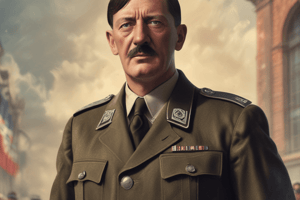Podcast
Questions and Answers
When did Hitler propose that Germany should have an army equal in size to France's army?
When did Hitler propose that Germany should have an army equal in size to France's army?
1933
What was the main reason Hitler was willing to allow Germany to be linked to Austria?
What was the main reason Hitler was willing to allow Germany to be linked to Austria?
Hitler's homeland was Austria. Austria and Germany had been linked for six centuries.
What did Engelbert Dollfuss, the Austrian chancellor, do to prevent Germany from uniting with Austria?
What did Engelbert Dollfuss, the Austrian chancellor, do to prevent Germany from uniting with Austria?
He banned the Nazi Party in Austria and did not want to unite with Germany.
In what year did Hitler respond to the Austrian Nazi's attempt to create havoc by encouraging them to murder Dollfuss in a bid for power?
In what year did Hitler respond to the Austrian Nazi's attempt to create havoc by encouraging them to murder Dollfuss in a bid for power?
What country was the Saar part of before the First World War?
What country was the Saar part of before the First World War?
In which year did a plebiscite take place to deciding whether the Saar would be controlled by France or Germany?
In which year did a plebiscite take place to deciding whether the Saar would be controlled by France or Germany?
The results of the plebiscite showed that 90% of the Saar’s population voted to rejoin Germany.
The results of the plebiscite showed that 90% of the Saar’s population voted to rejoin Germany.
International law agreed with Germany's decision to rearm.
International law agreed with Germany's decision to rearm.
What was the name of the 'Freedom to Rearm Rally' held in 1935?
What was the name of the 'Freedom to Rearm Rally' held in 1935?
By 1939, the German Army had grown to almost a million people.
By 1939, the German Army had grown to almost a million people.
The Treaty of Versailles allowed the creation of an air force.
The Treaty of Versailles allowed the creation of an air force.
Hitler's actions of building the Luftwaffe, which was banned by Treaty of Versailles, had no reaction from any other countries.
Hitler's actions of building the Luftwaffe, which was banned by Treaty of Versailles, had no reaction from any other countries.
When did Britain, France and Italy sign the Stresa Front?
When did Britain, France and Italy sign the Stresa Front?
The Stresa Front was successful.
The Stresa Front was successful.
When did Britain and Germany sign a naval agreement?
When did Britain and Germany sign a naval agreement?
Hitler was allowed to build up a navy to 35 per cent of the size of the British Navy, but was prevented from building submarines.
Hitler was allowed to build up a navy to 35 per cent of the size of the British Navy, but was prevented from building submarines.
The Anglo-German Naval Agreement was a sign to the world that Britain would support Germany.
The Anglo-German Naval Agreement was a sign to the world that Britain would support Germany.
Flashcards
Dollfuss Affair
Dollfuss Affair
Event in Austria where Hitler encouraged Austrian Nazis to overthrow the government, resulting in Dollfuss's assassination. Mussolini intervened, preventing Anschluss.
Hitler's rearmament
Hitler's rearmament
Secretly rebuilding Germany's military, in violation of the Treaty of Versailles.
Treaty of Versailles
Treaty of Versailles
Post-World War I peace treaty that imposed harsh restrictions on Germany's military and other aspects of its sovereignty.
Anschluss
Anschluss
Signup and view all the flashcards
Engelbert Dollfuss
Engelbert Dollfuss
Signup and view all the flashcards
Stresa Front
Stresa Front
Signup and view all the flashcards
Anglo-German Naval Agreement
Anglo-German Naval Agreement
Signup and view all the flashcards
Rearmament
Rearmament
Signup and view all the flashcards
Lebensraum
Lebensraum
Signup and view all the flashcards
Appeasement
Appeasement
Signup and view all the flashcards
Stalin
Stalin
Signup and view all the flashcards
Spanish Civil War
Spanish Civil War
Signup and view all the flashcards
Fascist
Fascist
Signup and view all the flashcards
Antisemitic
Antisemitic
Signup and view all the flashcards
Saar
Saar
Signup and view all the flashcards
Study Notes
The Development of Tension in Europe
-
Austria and Hitler: Hitler's rise to power in 1933 led to the banning of the Nazi party in Austria. In 1934, Hitler encouraged Austrian Nazis to create problems, resulting in the murder of Austrian chancellor Dollfuss. Italy's intervention prevented Anschluss.
-
Saar Region: In 1935, a plebiscite, or vote, in the Saar region determined if it would rejoin Germany. A massive majority voted for reunification. This was a propaganda victory for Hitler.
-
German Rearmament: Hitler defied the Treaty of Versailles by rapidly rebuilding Germany's armed forces. Conscription was reintroduced and an air force (Luftwaffe) was established.
-
Stresa Front: Britain, France, and Italy signed an agreement in 1935 to limit Hitler's actions. The agreement aimed to protect Austria and uphold the Locarno Treaties, but proved ineffective.
-
Anglo-German Naval Agreement: Britain and Germany signed an agreement in 1935. Germany was permitted a navy up to 35% of the size of Britain's. The agreement effectively ended naval restrictions from the Treaty of Versailles..
-
Key Figures: Engelbert Dollfuss (Austrian chancellor), key figures in the Stresa Front and the Anglo-German Naval Agreement.
Studying That Suits You
Use AI to generate personalized quizzes and flashcards to suit your learning preferences.



